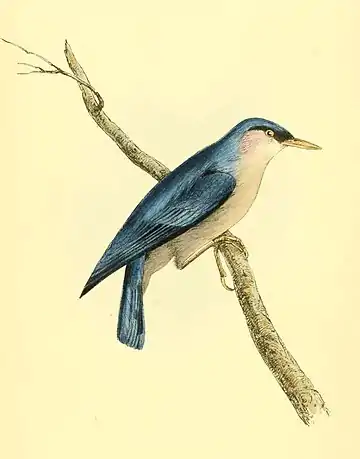
SITTA frontalis.
Blue Nuthatch.
Generic Character.
- Rostrum rectissimum, acutum, compressum; utroque mandibulo ad apicem æque inclinato; apice integro cuneo compresso simili. Nares basales, ovales, apertæ, plumis setaceis incumbentibus extrinsecus tectæ. Pedes tribus digitis anticis; uno postico; digitus interior minimus; exterior ad basin medio connexus; hallux productus validus. Ungues compressissimi; antici subæquales; posticus maximus. Cauda brevis, rectricibus duodecim subæqualibus.
Typus Genericus S. Europæa.
- Bill very straight, sharp-pointed, compressed; both mandibles equally inclining to the tip, which is entire, and resembles a compressed wedge. Nostrils basal, oval, open, covered externally with incumbent setaceous feathers. Feet with three toes forward and one backward; inner toe very small; outer toe connected to the middle at its base; hind toe lengthened, strong. Claws much compressed; anterior nearly equal, posterior largest. Tail short, of twelve nearly equal feathers.
Generic Type Sitta Europæa.
Specific Character.
- S. supra cœrulea; supercilio, fronte, et remigibus lateralibus in medio nigris; subtus cinereo-fusca, auribus lilacinis, mento albo.
- Nuthatch, above blue: line above the eye, front, and middle of the lateral tail-feathers black; beneath cinereous brown, ears lilac, chin white.
The present species is one of the many interesting birds collected in Java by my friend Dr. Horsfield: it was not, however, until I had described and engraved another specimen, sent to Sir J. Banks from Ceylon, that I discovered the species had already been included in the Doctor's account of the birds of Java, presented to the Linnæan Society, where he has described it under the name of Orthorynchus frontalis.
The specific name of its first describer is of course retained: with respect, however, to its generic situation, I must be allowed to dissent from considering it as a distinct genus, merely from the prolongation of the hinder toe being somewhat more developed than in Sitta Europæa and Carolinensis, both which birds are now before me, and which in themselves differ in the relative proportion of this part: thus in S. Carolinensis the hind toe and claw is two-tenths of an inch shorter than the leg; in S. Europæa it is one-tenth shorter; and in the present species it just exceeds that of the leg: in every other respect not the slightest difference I apprehend will be observed.
Total length five inches. Size of the European Nuthatch. Bill, from the angle of the mouth to the tip, eight lines; front of the head velvet-black, continued in a stripe of the same colour over the eye, and terminating above the ear feathers: the upper plumage is of a rich blue, more brilliant on the head, and paler on the front, and external margins of the quills. Spurious wings and lesser quills black margined with blue. Inner wing-covers deep black; the under plumage is a light-brown, changing to lilac on the ears and sides of the neck, and tinged with cinereous on the flanks and vent: the chin is white; tail even, the two middle feathers blue, the rest more or less black, having the external margins and tips blue. The outer quill of the wings is short, the second and third longest and equal, the fourth rather less; the hind toe with the claw, measures one inch in a straight line.